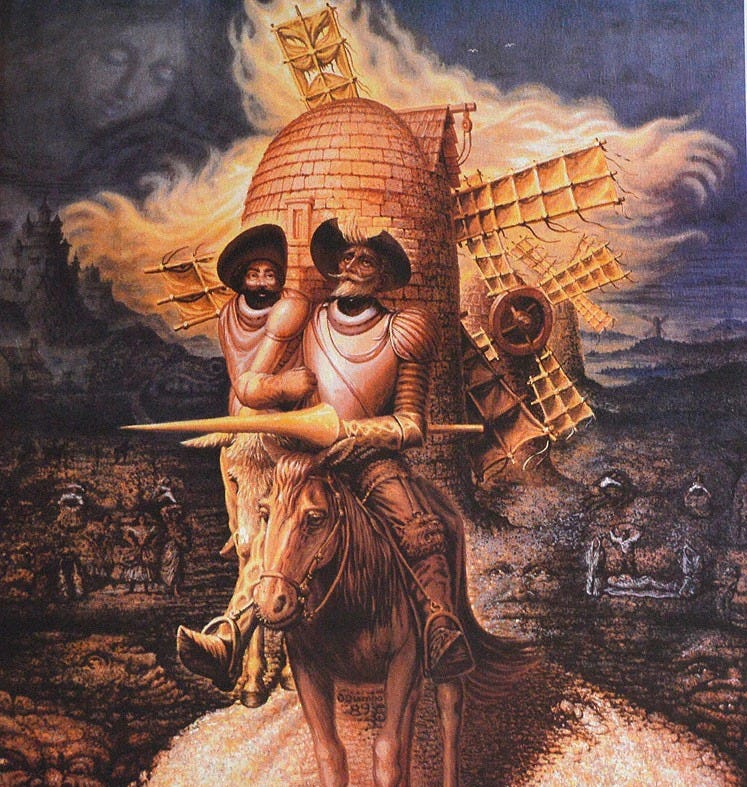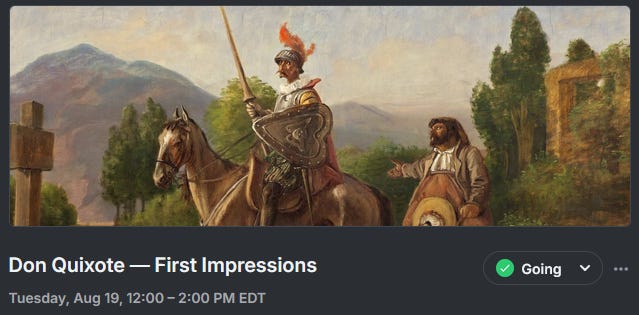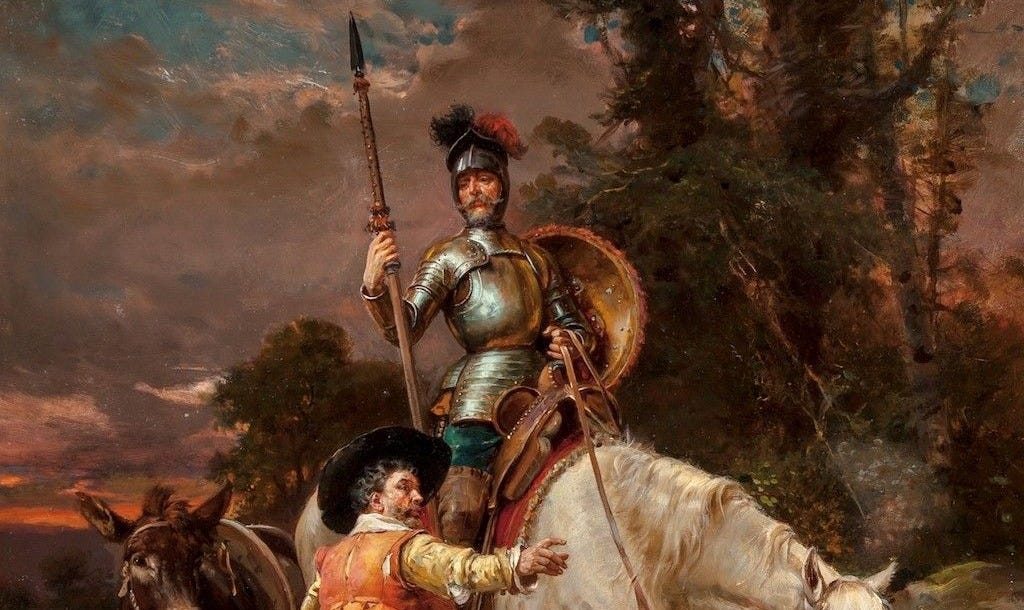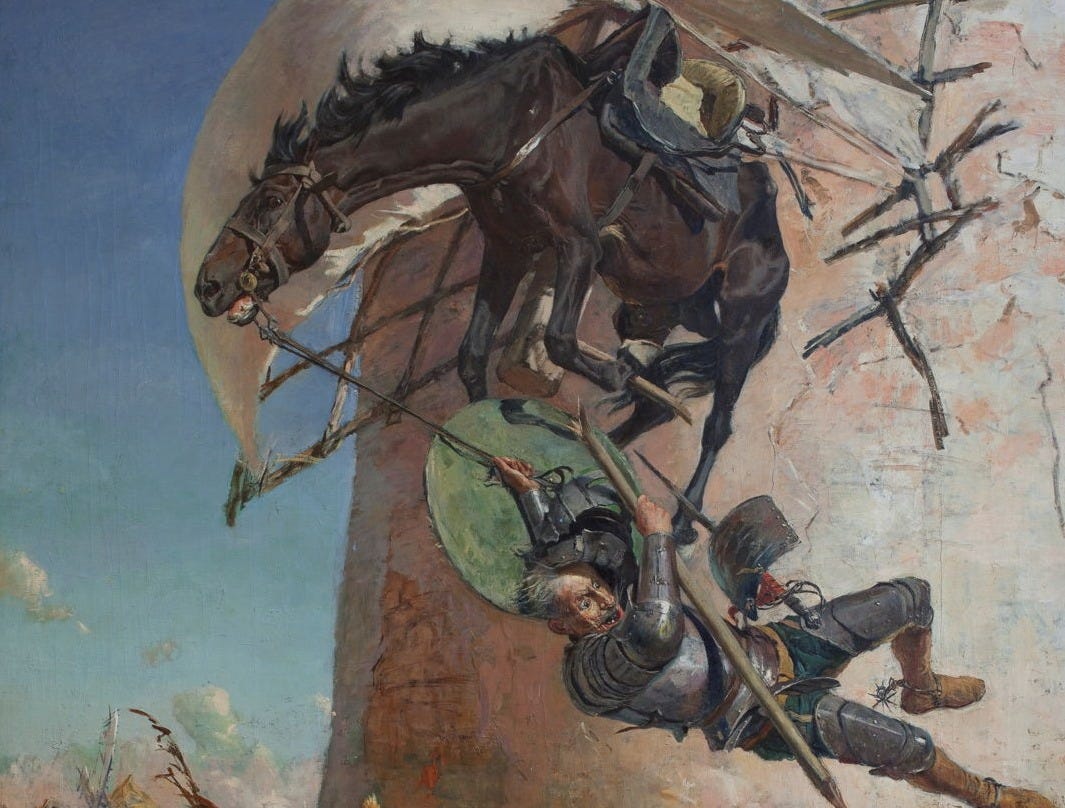How Can Modern Man Find Meaning?
A 400-year-old novel has the answer
Don Quixote is far more than the story of a delusional knight, rather it’s an archetypal novel that explains what it means to be a modern man.
When you understand the significance behind Don Quixote’s madness, this comedic tale becomes a guide to understanding yourself, and how to discover authentic meaning and beauty in a modern world that has lost its luster and proclaimed life is meaningless.
Here then, is what Don Quixote teaches you about the soul of modern man, and how its wisdom can help you find your life’s adventure…
Don’t forget to join our FREE book club!
We started a digital book club to study the great texts of Western Civilization — from Dante to Dostoevsky — together. Inside, you’ll get:
Live community book discussions (bi-weekly)
New, deep-dive literature essays every week
The entire archive of book reviews + our 100 great texts reading list
Our first discussion on Don Quixote takes place TOMORROW, August 19 at 12pm EST!
Sign up below to attend — all paid members can join the live discussion up on stage…
Note: paid subscribers via Substack will automatically receive an access link for the live calls.
Chivalry and Insanity
To recap the plot, the novel follows protagonist Alonso Quixano. He’s a 50 year old hidalgo (nobleman), living in the rural Spanish countryside in the 16th century.
He’s disillusioned with the modern world, which has become increasingly secular and cynical. As a result, life appears to him as banal, uninspired, and drab.
Quixano seeks escapism through literature, and pours his mind into chivalric romances. These are tales of noble knights of valor who rescued maidens, slay dragons, and bring peace to a fallen world filled with crime.
However, Quixano reads one too many romances. He falls so in love with chivalry that he goes insane:
Suddenly, he believes he’s a knight in medieval Spain. He goes by the new alias Don Quixote, recruits a squire (his neighbor, Sancho Panza), and dons some old rusted armor. The two men ride off into the countryside in search of adventure.
What follows instead is 1,000+ pages of comedic misadventures that have etched their mind into the heart and soul of modern man.
A Self-Made Man
The rest of the Don Quixote’s adventures can be summed up in this sequence:
Don Quixote searches for adventure.
He misperceives reality (i.e. mistakes windmills for giants)
Takes action to disastrous consequences (charges a windmill on his horse)
Leaves behind chaos in his midst (crashes into a brick wall in this case)
This simple formula basically repeats itself for 1,000 pages.
So why then is this story important? At the surface, the plot seems inconsequential… Don Quixote is nothing but a mad man.
Literary critic Gyorgy Lukacs explains the significance of Don Quixote’s madness:
“The novel is the epic of a world that has been abandoned by god. The novel’s hero’s psychology is demonic. The objectivity of the novel is the mature man’s knowledge that meaning can never penetrate reality, but that without meaning, reality would disintegrate into the nothingness of inessentiality”
The story is revolutionary because it’s divorced from tradition. Cervantes himself acknowledges that this story was written without reference to the great thinkers and books that preceded him.
He didn’t concern himself with Aristotle, Horace, Virgil, Ovid, or the Catholic Church (the great thinkers/institutions of Western Civilization), rather he wrote this book in isolation without reference to the past.
Don Quixote himself reflects this emptiness, this “world abandoned by God.”
We know nothing of Quixote’s past, his family, or his roots. All we know is that he’s a 50 year old man who loves chivalric romances. Even his library is devoid of books of history, scripture, or religious devotions.
This story then, isn’t just the story of insanity. It’s the first story of modern man, and modern man is defined as one who tries to invent himself.
Tradition says you find your identity in the great books and tradition of the past, but modernity says you are an autonomous individual who crafts your identity as you see fit — you don’t “find yourself,” rather you create yourself.
This quest of self-creation is the heart and soul of Don Quixote. It sounds fun, perhaps freeing and liberating, but we’ll also see this freedom comes at a great cost.
Modern man’s freedom presents him with newfound challenges, and if he can’t solve these challenges, he’ll succumb to sadness and despair. But a closer reading of Don Quixote holds the key to overcoming them — and how to find your life’s adventure when everything seems meaningless…






